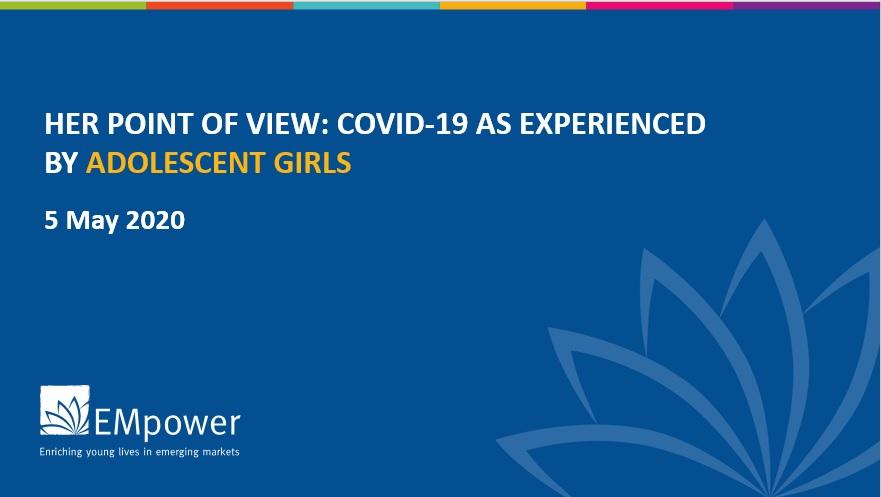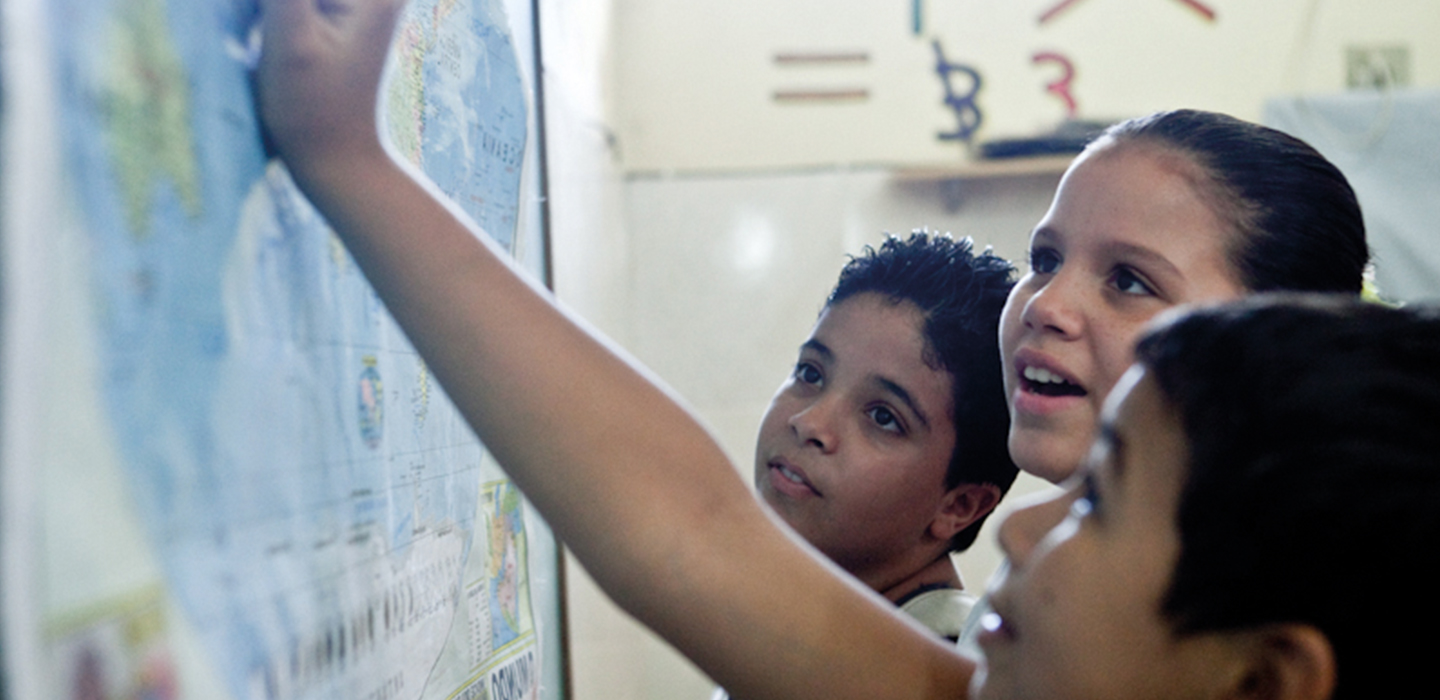Latest News
EMpower spotlights impact of COVID-19 on adolescent girls in India
Posted 11 May 2020 in EMpower News, Grantee Partner News | Share

One can learn from history how global crises exacerbate existing inequalities. Vulnerable groups are pushed further into the margins where access to safe, healthy and productive means of living becomes nearly impossible. The onset of COVID-19 has reiterated how public health outbreaks disproportionately affect girls and women and threaten to reverse the progress made with regards to their mobility, education, livelihoods, food security, sanitary hygiene, protection from abuse, and sexual and reproductive health rights.
On May 5, EMpower organized and hosted a webinar, ‘Her Point Of View: COVID-19 as experienced by Adolescent Girls’, spotlighting the impact of COVID-19 on
adolescent girls in India. The panel comprised Meenu Vadera from Azad Foundation, Nandita Shah from Akshara Centre, Rubi from Feminist Approach to
Technology, and Seema Dosad from Vacha Charitable Trust. All four organizations are EMpower grantee partners whose COVID-19 relief interventions are designed to address the gendered impact of the pandemic. Additionally, Rubi and Seema are on the Girls Advisory Council, a group created by EMpower of girl leaders who represent our partners in India and advise on our grant-making strategy in the country, helping to strengthen our girl-centered programming. The webinar was moderated by Nisha Dhawan, India Country Director, EMpower.
With a firm belief that girls are the experts on their own lives, EMpower continuously seeks to develop opportunities to amplify the voices of adolescent girls. The objectives of this webinar were to call attention to the experiences of girls from underserved communities in light of COVID-19, and to build knowledge around how practitioners can facilitate girl leaders to be front and center in their relief interventions.
Questions addressed by the panelists
- How do you think COVID-19 impacts girls?
- What are you/your organization doing to reach out to girls during COVID-19?
- What are the 2-3 ways in which practitioners can put girls at the center of their COVID-19 response?
- What are some of the consequences of practitioners failing to center girls in their COVID-19 response?
- What do you think are the short- , medium- and long-term effects of COVID and the lockdown in India will be for adolescent girls and young women?
Highlights
“It is very important for girls to be heard.” – Seema Dosad, who has been closely involved in Vacha Charitable Trust’s COVID-19 response.
- Seema strongly advocated the importance of solidarity networks during these unprecedented times. Through the lockdown, she has been in touch with girls in her community through various social media and communication platforms to understand which households need ration.
- She also reiterated the role of technology in communicating accurate COVID-19 information to girls in order to counter fake news that can create panic in communities.
- Due to the lockdown, sanitary napkins are not easily available and Seema shared how she and several girls have benefited from Vacha including menstrual hygiene products in their relief kits.
- Vacha has been encouraging girls to journal their experiences, which Seema believes, can go on to become important resources for non-profits while responding to crises in the future.
“The COVID-19 pandemic is clearly aggravating inequalities faced by girls.” – Rubi works at Feminist Approach to Technology, and is an integral part of their campaign, ‘Spread Compassion, Not Corona’.
- Rubi said, “In India, having an individual identity is already difficult for women, but the COVID-19 situation has completely restricted our mobility. And even the ones who had negotiated mobility – will now have to struggle to restart all over again.”
- She stressed on the urgent need for platforms to redress violence that girls and women are being subjected to while being confined indoors due to the lockdown.
- Alluding to Feminist Approach to Technology’s COVID-19 campaign, Rubi highlighted that compassion towards each other is most important – “We all need to support each other in accessing relief support and stand in solidarity with those who are vulnerable in our communities.”
“We must pay attention to women’s participation in the workforce and make sure that girls remain in schools.” – Meenu Vadera, who is the CEO at Azad Foundation, an EMpower partner since 2014
- Meenu shared how women living in joint families are forced to bear the entire burden of household responsibilities during this lockdown. She expressed her fears about how they may not be allowed to take an independent decision of joining the workforce once this crisis is over.
- Underscoring the importance of livelihoods with dignity for women, Meenu stated how women’s participation in the workforce has been steadily declining and that the lockdown threatens to make this worse.
- She said that if money is taken away from the hands of women, it will have catastrophic consequences with regards to their agency and decision-making powers in the household.
- In the midst of despair, Meenu said that she sees some hope from this crisis serving as a great opportunity to enhance women’s leadership capacity and shared examples of how Azad Foundation’s program participants have become the points-of-contact for relief work in their communities.
“Social capital built between girls needs to be re-appropriated and strengthened.” Nandita Shah, who is the Co-Founder and Co-Director at Akshara Centre, an EMpower partner since 2011.
- Nandita said that building agency in girls and women is going to be the real concern after COVID-19. She was afraid that girls’ voices were missing in human rights policies and this would likely worsen.
- Girls resuming their education, having access to mobile phones, things that they were able to do until a few months ago were now going to open questions with no certain answers.
- She said that it is important to get the right kind of information to the girls for themselves, their families and their community.
- Acknowledging how the lockdown and social isolation can have a detrimental effect on girls’ mental health, Nandita lay emphasis on providing mental health counselling through tie-up with professionals.
- She also said they were exploring ways of advocating gender-responsive health relief strategies to the government.
A big thank you!
More than 200 participants attended the webinar. We want to thank all of our colleagues, partner organizations, and young people who took the time out to join us for this conversation. Thank you for also spreading the word and helping us reach more people!
Here is a recording for those of you who were unable to attend.
A big thank you to all four panelists! We have been receiving such positive feedback about the critical wisdom and rich insights you brought to the table. We express our gratitude for the energy and enthusiasm with which you participated in this webinar.
A special shout-out to our girl leaders, Rubi and Seema, who have been so actively involved in the COVID-19 responses of their organizations, and were able to successfully throw light on the experiences of the girls in their communities!
View All NewsMore Latest News
- We are Hiring: Programme Consultant, Peru
- Posted 23 April 2024
- A Word with Prarthana Kumar
- Posted 16 April 2024
- Finding the Power
- Posted 16 April 2024
Upcoming Events
Connect with EMpower
Stay up-to-date on the latest EMpower news, highlights from our grantee partners, upcoming events, and more.
Make a Difference with EMpower
Our Board Directors and the Leadership Council underwrite all of our Management, General and Fundraising expenses, so 100% of your donation goes directly to empowering marginalised young people.

